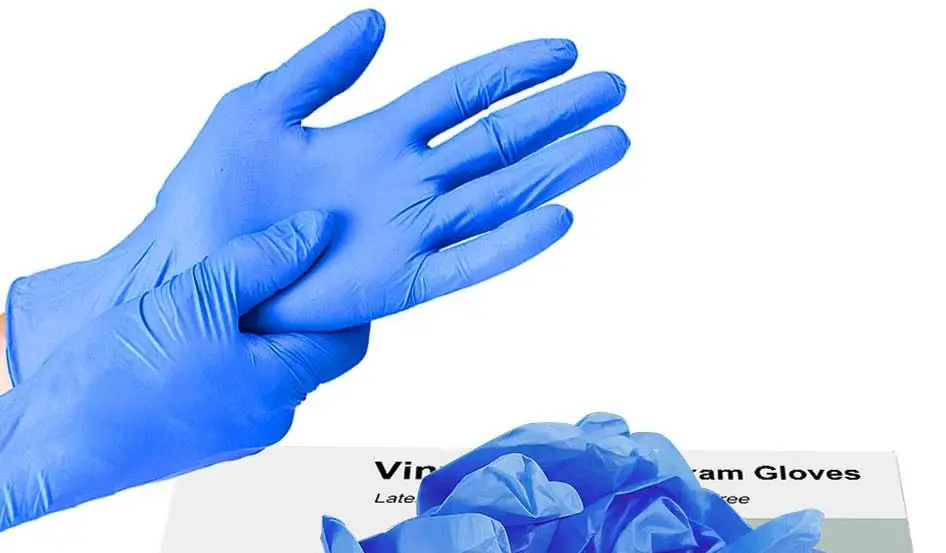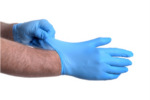Vinyl gloves have been long used in the food prep industry as well as the healthcare sector. There are though certain health risks that have put vinyl gloves on the backfoot when it comes to high-risk jobs.
One of the reasons that vinyl gloves gained such popularity is that they do not contain latex. They’re the cheapest alternatives for rubber gloves that contain latex.
You can wear vinyl gloves for as long as four hours straight. Since they’re latex-free, you won’t catch serious skin diseases that latex causes.
That being said, vinyl gloves can also cause allergic reactions. That’s however a very rare scenario.

Wish to know more about vinyl gloves? Keep reading this guide and, by the end, you’ll have all the answers about vinyl and latex gloves at the back of your hands.
What are vinyl gloves made of?
Vinyl gloves primarily contain PVC and plasticizers. It’s quite easy to glide these gloves on and off. That’s one reason why they gained popularity in the first place.
PVC (the main constituent of vinyl gloves) is known as polyvinyl chloride. It’s a petroleum byproduct. When mixed with plastics, it makes vinyl gloves pliable and stretchable.
Plastics, on the other hand, cause major environmental pollution since they make vinyl gloves non-biodegradable.
Besides, vinyl gloves also contain 50% BPA. Though they’re still widely used as examination gloves in countries where they’re not banned, using them for low-risk jobs in medicine is a better idea.
Not using vinyl gloves for medical purposes where there’s direct contact with bodily fluids is safer.
That being said, vinyl gloves have their fair share of advantages as well (to be explained in detail in a later section). When used for purposes they’re apt for, they offer protection to hands.
Are vinyl gloves the same as latex?
No. Vinyl gloves and latex gloves are entirely different from each other. Vinyl gloves are, in fact, an inexpensive and popular choice for people who are allergic to latex.
Since allergic reactions to vinyl are rare and the fact that they can offer protection for up to four hours, they can be used for low-risk purposes.
2 Major Advantages of vinyl gloves
Despite the alarms that vinyl gloves have raised, certain advantages still cannot be overlooked. We’ve listed two such advantages of vinyl gloves in the upcoming sections. Have a look!
#1. They’re an affordable replacement for latex gloves
Vinyl gloves do not contain latex and they’re inexpensive. Clearly, it means that people who have latex allergies can buy vinyl gloves instead since these gloves are affordable.
So, you don’t have to deal with latex allergies just because the cost is limiting you. Vinyl gloves are the affordable answers to cost limitations!
#2. They’re waterproof and oil-resistant
You can wear vinyl gloves when painting or where there’s a risk of greasing because of the fact that they’re waterproof and oil-resistant. (Are Vinyl Gloves Oil Resistant?)
Besides that, they’re also:
-
-
- Protein-free
- Allergy-free
- Anti-static
- Easier to wear and remove
-
2 disadvantages of vinyl gloves
#1 They offer a lower degree of protection at high-risk jobs
Did you know that the failure of vinyl gloves against blood-borne pathogens is a whopping 61% in comparison to nitrile and latex gloves?
It has been tested and proven that it takes as little as twenty minutes for viruses and bacteria to start breaking through the surface of vinyl.
Hence, they’re extremely unsafe for protection against blood-borne pathogens
#2 They’re not much protection against chemicals
As already mentioned, the surface of Vinyl gloves becomes permeable to bacteria and viruses within 20 minutes. It’s even lower protection than that when it’s about harsh chemicals.
Vinyl gloves cannot protect against acids and ketogenic solutions. So, they’re not very good options for lab workers either.
Major Differences between vinyl gloves and latex gloves
Vinyl and latex gloves are quite different. In order to understand which of the two is better, it’s quintessential that you go through the comparison between the two as listed below.
1.) Allergy quotient
One of the reasons behind this post is to explain that vinyl gloves are latex-free. Naturally, latex allergy shouldn’t be taken lightly.
If you have a latex allergy, latex gloves are a big no-no. Instead, you can rely on vinyl gloves that are latex-free.
Also, allergic reactions to vinyl are extremely rare. That too, those skin reactions aren’t as bad as skin’s reaction to latex.
2.) Tensile strength
Latex gloves are actually about 40% stronger than vinyl gloves when twisted, stretched, and flexed.
Naturally, latex gloves are more resistant to wear and tear, cuts, and punctures than vinyl gloves.
3.) Biomedical contamination
Again, latex gloves are stronger barriers between your hand and biomedical hazards like pathogens and chemicals. However, the strongest and safest are nitrile gloves.
But, if it has to be between vinyl and latex gloves only, then latex gloves offer better protection against biomedical contamination.
Now, you might be wondering why even bother using vinyl gloves when latex gloves are more tensile and more chemical-resistant than vinyl gloves?
Well, the answer is that many people are allergic to latex. And some might not even know it until a reaction happens. That’s why vinyl gloves are used.
What is the purpose of vinyl gloves?
The first very obvious purpose is protection from latex allergy. Other than that, vinyl gloves can also be used for low-risk jobs like:
-
-
- Painting
- Printing
- Oiling
- Regular cleaning
-
Can you be allergic to vinyl gloves: 3 Queries answered
Vinyl allergies are rare, but not impossible. Being waterproof is one of the reasons behind vinyl allergy.
When worn for a long time, vinyl gloves trap sweat and moisture inside. It gets absorbed in the skin. This condition is known as Contact urticaria.
Also, since vinyl gloves contain substances like carb-mix, PVC, and thioureas, even these substances can be absorbed alongside sweat. Again, the result is Contact urticaria.
It’s rare, but it can happen. Let’s now address the 3 queries related to vinyl glove allergies.
#1. How common is a vinyl allergy?
Vinyl allergy is extremely uncommon and unheard of. These gloves are anti-static and they do not contain any protein either. That’s why vinyl allergies are so rare.
Even if an allergy happens due to vinyl contact, most of the time, it disappears within 24 hours after you take the gloves off.
Here’s another fact: Contact urticaria isn’t only a result of vinyl exposure. It can also happen because of other materials. Vinyl is the least susceptible to giving you this allergy.
#2. What does a vinyl allergy look like?
The first thing to know is that if it’s a vinyl allergy you’re experiencing, it will start showing symptoms within 10 minutes of donning the gloves.
Here’s what a vinyl allergy would usually look like:
1.) The affected patch of the skin might have welts and raised skin.
2.) Rashes, itching, and redness are the common symptoms.
3.) Cracked skin and pain are the other symptoms.
Now, it’s not necessary that all the symptoms will occur. Even if one or two symptoms occur, but they happen within 10 minutes of wearing vinyl gloves, it’s highly likely that you’re having an allergic reaction.
#3. How to treat vinyl allergy?
Since vinyl allergy isn’t very serious, you don’t have to worry a lot about it. Usually, it disappears on its own within a day as soon as you remove the gloves.
Some other treatments that can help are as follows.
• Wash the hands with soap. Use non-allergenic moisturizer.
• Don’t let the hands become dry or too wet.
• Use cold packs to reduce the feeling of burn and inflammation.
The truth about vinyl allergy is that it is mostly a result of cornstarch powder. Hence, you should rely on powder-free vinyl gloves since they’re safer than powdered ones.
Why have certain countries banned or limited the use of vinyl gloves?
Plasticizers, BPA, and phthalates are the culprits behind almost all the issues related to vinyl gloves.
If you go into the details, the cross-linked polymers in vinyl gloves come apart if the gloves are flexed again and again. Naturally, it will put your hands at risk. That’s why vinyl gloves should not be used for more than 4 hours.
The main reasons that certain countries are trying to minimize the production and use of vinyl gloves are as follows:
• Human skin can absorb BPA and phthalates when there’s frequent contact. And both these products are highly carcinogenic.
• Viruses and bacteria can still pass through the surface of vinyl.
• Landfills are crowded with vinyl since it’s not biodegradable.
These are some real threats that the FDA has realized. Countries and counties that have either banned or limited the use of vinyl gloves to low-risk jobs are listed below.
• 60 Spanish cities have banned PVC.
• Japan and the European Union do not allow the use of PVC for food preparation. It’s illegal.
• The US has put a ban on phthalates in toys. However, it’s still not illegal to use vinyl gloves in the food industry or the medical sector in many states in the US.
• Sweden has been perpetually working hard to eradicate PVC since 1995
FAQs
1. Is vinyl glove latex-free?
Yes. Vinyl gloves are entirely free of latex. Some people might think that they have traces of latex, but it’s untrue.
Vinyl gloves are absolutely devoid of latex. On top of that, they’re also protein-free. Thus, the chances of having a vinyl allergy are very less.
2. Are vinyl gloves safe?
It depends on your definition of safe and the purpose you’re using them for. Let’s find out the details:
Vinyl gloves are safe: if you have a latex allergy, if your work is low-risk, if you don’t have to work with harsh chemicals, and if you do not wear the gloves for more than four hours.
Vinyl gloves are not safe: if you are a surgeon, if your job has a risk of cross-contamination, if you work where there’s a risk of contracting blood-borne pathogens, and if you’re a chef.
3. Do vinyl gloves protect against blood-borne pathogens?
No. Vinyl gloves won’t protect against blood-borne pathogens, bacteria, and viruses.
They’re not suitable when you work directly in contact with blood and bodily fluids. They’re not just a threat to you but also others.
4. Are vinyl gloves used in hospitals?
Yes, they are still used in hospitals in the states where they are yet not illegal for medical practice.
Just because they are still used in hospitals doesn’t mean that they should be used. If you’re a surgeon, a lab worker, or an OT nurse, wearing vinyl gloves is unsafe for you as well as the patients.
Only when there’s no risk of cross-contamination should you use vinyl gloves in hospitals.
5. Are vinyl gloves medical grade?
Ideally, vinyl gloves aren’t at all safe for medical purposes. But, they’re not banned in all countries yet.
If their AQL quotient is within the limit approved by OSHA, they can be classified as medical grade. That’s why, despite health concerns, hospital staff still use vinyl gloves.
6. Are vinyl gloves BPA-free?
Absolutely not. Their composition is such that they have more than 50% BPA. There have been constant efforts to reduce the amount of BPA and phthalates in vinyl gloves to make them less harmful.
7. Can vinyl gloves be used for food preparation?
The use of vinyl gloves in food handling is absolutely banned in Japan. Now, it’s illegal to use vinyl gloves for food preparation in Japan, but in countries where it’s not illegal, vinyl gloves are still used for food preparation and handling.







